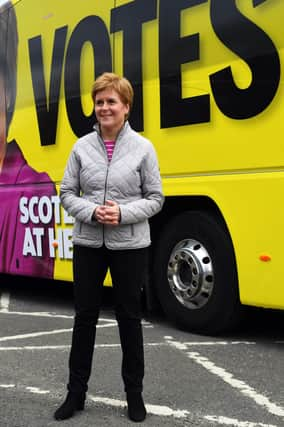Judgement day beckons, is the First Minister’s number up? - Brian Monteith


I’ve lost count of the number of scandals that have we have been presented with where SNP politicians have simply carried on regardless; still drawing their generous salaries and adding to their pension pot, both at the taxpayers’ expense; unaccountable to no one and shamelessly avoiding creating a by-election where the public can express its anger and disappointment. I count at least half-a-dozen.
Another shameful number is the many financial deals that have cost the Scottish taxpayer tens or even hundreds of millions, to procure ferries that can’t sail, life-threatening hospitals, construction yards without orders, an airport without flights and an aluminium smelter that is in meltdown. The total cost of the waste and incompetence is approaching a billion – yet has any SNP minister paid a price for the failure? Zero.
Advertisement
Hide AdAdvertisement
Hide AdThere are other, frankly, horrific numbers; the record number of drug deaths (1264) – the highest rate in Europe; the number of homeless people dying (216) – a rate three times worse than in the rest of the UK; the thirteen council areas in Scotland where life expectancy is actually falling; the rising child poverty, indeed the worsening poverty in practically every way it is measured, including poverty in old age and relative poverty.
Two important points about these numbers; first they are all pre-Covid (so expect new stats to be even worse). Second is the responsibility for them lies firmly with the First Minister residing comfortably in her official residence of Bute House (sans the promised refugee) – not with Westminster, Whitehall or Downing Street. The rest of the UK operates under the same laws and same funding formula but achieves better numbers. The common factor is the incompetency of the SNP Government which took its “Eyes off the ball” a long time ago because it was watching something else (holding a second referendum).
After the first referendum of 2014 we badly needed a Government that would heal the deep divisions in the country; heal the scars and treat the wounds. Instead Nicola Sturgeon took charge and doubled-down by working for another referendum – completely refuting the democratic outcome she had promised to respect.
Then, after the EU referendum, when there was yet more division created, the First Minister intentionally stoked the divisiveness – with her SNP MPs infamously ensuring an amendment to keep the UK in the EU’s Customs Union lost by 6 votes – and later, having created the impasse, voted for a general election because it was to her party’s advantage.
The most shocking number must be the number of unnecessary deaths caused by the bad management of the Covid pandemic. Yes, it was an existential challenge for the Scottish Government, just as it was for any, but why did Nicola Sturgeon and Jeanne Freeman carry on emptying untested elderly patients from hospitals into care homes when Matthew Hancock had stopped? It was their decision and theirs alone. The apparent need to do things differently from the rest of the UK cost lives. A number that yet to be quantified – but one was one avoidable tragedy too many.
And then there are the numbers that don’t add up – the SNP’s higher taxes that deliver lower revenues!
Thursday’s election is all about numbers. The numbers that would normally disgrace any politician in office; the numbers of people who are scunnerred with the state of our politics and decide to stay at home, the numbers that will determine who forms the government.
Voters need to look at the numbers. Not just numbers that confirm the cost in needless lives lost, the numbers in millions wasted and the SNP’s numbers proposing more of the same – but the numbers that decide who gets elected and what difference the winners can make.
Advertisement
Hide AdAdvertisement
Hide AdIf people want to reverse or at least alleviate the human carnage of our most vulnerable – the addicts, the homeless, the ill, the elderly, the suicidal – then we should forget our past political loyalties and look at the numbers that make up Holyrood. Can you make a difference by joining the numbers of people voting tactically?
If the numbers where you live say voting for the best placed candidate to beat the SNP makes sense then why not look up www.VoteUnion.UK and find out who in your constituency you should vote for – simply key in your postcode and it will give you a recommendation.
With your second vote – the regional lists – the numbers are more complicated, but one number that’s generally not known is that to make a difference in the Scottish Parliament you really need to have five MSPs. It is only when you reach that threshold a group of MSPs is given a place on Holyrood’s Corporate Body that manages its business; it’s only then the leader is given a regular slot in questioning the First Minister. Sending lone individuals – no matter how able and experienced – to take on the might of the establishment will not work. It needs numbers.
If you support smaller parties – which I am disposed towards – you should vote for them because you believe in what they stand for not because of a single personality. Sadly, the battalions outnumber the platoons.
This is not about a referendum (it ain’t happening); it’s about the SNP record and changing the figures for the better.
I started by saying this column’s about numbers, and I think I’ve shown quite a few that might make people think before they vote. If you found some of them uncomfortable, annoying or upsetting then surely you have to agree the First minister’s number must be up – and vote accordingly.
Brian Monteith is editor of ThinkScotland.org and served in the Scottish and European Parliaments for the Conservative and Brexit Parties respectively.
Comments
Want to join the conversation? Please or to comment on this article.